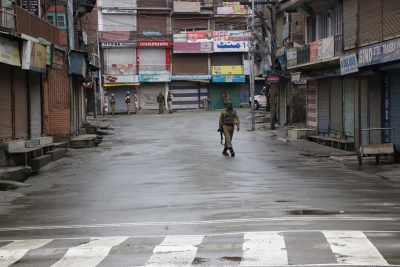Washington: The Kashmir issue will figure again in the US with the Tom Lantos Human Rights Commission calling a hearing Thursday to examine the human rights situation in the erstwhile state of Jammu and Kashmir in a “historical and national context”, following abrogation of its special status August 5.
The Tom Lantos HR commission said: “Witnesses will examine the human rights situation in Jammu and Kashmir in the context of the region’s history and larger patterns of rights violations in India and Pakistan, and will offer recommendations for action by the Congress.”
Among the witnesses called to testify are: Anurima Bhargava, Commissioner, US Commission on International Religious Freedom, Sehla Ashai, Human rights lawyer, Yousra Fazili, Human rights lawyer and Kashmiri-American cousin of Mubeen Shah, detained Kashmiri businessman, and Arjun S. Sethi, Human rights lawyer and Adjunct Professor, Georgetown Law.
Earlier, in a Congressional hearing on Kashmir, on October 22, Alice G. Wells, Acting Assistant Secretary of State, Bureau of South and Central Asia, in her testimony had said the State Department was closely monitoring the situation in Jammu and Kashmir following abrogation of its special status.
She told the House Foreign Affairs Sub committee on Asia and the Pacific that while the US supports the objectives of the Indian government that revocation of Article 370 was driven by a desire to increase economic development, reduce corruption, and uniformly apply all national laws, the “Department remains concerned about the situation in the Kashmir Valley, where daily life for the nearly eight million residents has been severely impacted since August 5”.
“We welcome actions by the Indian government to improve the situation and address local grievances.”
The Tom Lantos HR Commission, in a statement said the “Indian government’s decision to change the legal status of the Muslim-majority state of Jammu and Kashmir has attracted intense attention due to persistent reports of human rights violations, including a crackdown on freedom of expression; the arbitrary “preventive” detention of hundreds of politicians, lawyers, journalists, and other civil society figures and related fears of enforced disappearance; and the use of excessive force against protesters.”
“The increased militarisation of the security presence in the region and the economic and social consequences of the Central government’s actions, including continuing restrictions on internet and phones, have also provoked widespread concern. In addition, militants have targeted migrant workers from outsider Kashmir, and have threatened businesses to maintain a protest shutdown.”
A follow-up OHCHR report in July 2019 found little improvement and reiterated the “urgent need to address past and ongoing human rights violations and to deliver justice for all people in Kashmir. Nor are the human rights problems limited to the Kashmir region. Patterns of human rights violations have been documented at the national level in India and Pakistan, including by the US Department of State in the annual Country Reports on Human Rights Practices,” it said.
On October 26 too, the US Congress told Indian envoy Harsh Vardhan Shringla that despite his “update” on the situation in Kashmir, many people have painted “a much different picture”, and asked him to provide answers to several queries, including how many have been detained under the Public Safety Act, on reports of use of rubber bullets, and whether journalists and members of the US Congress will be allowed free access to the region.
The Congress, in a letter, said that following Shringla’s briefing members of the House Foreign Affairs Committee on October 16 about the situation in Jammu and Kashmir, it requested for “more specific information regarding some of the questions raised at that time”.
